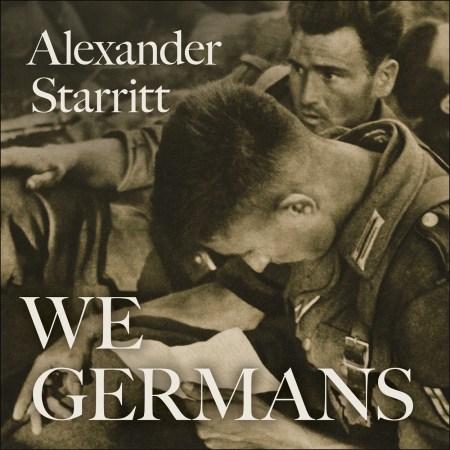We Germans
On sale
14th May 2020
Price: £19.99
We Germans takes the form of a letter written by the now 90-year-old soldier to his grandson, telling him of his experiences in the war, and his grappling with the extent to which he feels guilt and shame about his own behaviour, and the behaviour of Germany. The novel is interrupted at various points by the grandson, who offers his own perspective on his grandfather.
Starritt delicately and deftly explores the moral considerations of a young soldier in that position, what he or anyone else would/should do, and whether a life of loving and sacrificing for your family post-war could make up for inhumane acts.
The storytelling is excellent, and totally gripping. It’s also very human; there are horrors, generally unseen but occasionally seen, and the events take place against this backdrop, but it’s more about the everyday experiences of soldiers, and among the horror and confusion there are moments of humour and life, as well as acts of great bravery and selflessness.
(P) 2020 Hodder & Stoughton Ltd
Starritt delicately and deftly explores the moral considerations of a young soldier in that position, what he or anyone else would/should do, and whether a life of loving and sacrificing for your family post-war could make up for inhumane acts.
The storytelling is excellent, and totally gripping. It’s also very human; there are horrors, generally unseen but occasionally seen, and the events take place against this backdrop, but it’s more about the everyday experiences of soldiers, and among the horror and confusion there are moments of humour and life, as well as acts of great bravery and selflessness.
(P) 2020 Hodder & Stoughton Ltd
Newsletter Signup
By clicking ‘Sign Up,’ I acknowledge that I have read and agree to Hachette Book Group’s Privacy Policy and Terms of Use
Reviews
A remarkable and audacious novel that is harrowingly real and, at the same time, asks the most searching questions about men at war
An impressively realistic novel of German soldiers on the eastern front, raising the fundamental questions of individual and collective guilt
This may be only his second novel, but Alexander Starritt is already showing striking signs of ambition ... a visceral examination of guilt, collective and individual, centred on a small group of bedraggled German soldiers on the eastern front . . . individual episodes are vividly done, and the book has a gritty realism. Its arguments about the equivocal nature of guilt on the battlefield can be arresting
Daringly, in what is only his second novel, Alexander Starritt climbs into the skin of one of the most appalling archetypes of the 20th century: a Nazi soldier as he marauds across eastern Europe during the second world war
A stirring work that reads like a developing photograph, the lines slowly clarifying, the light steadily emerging from the dark . . . an unflinching reckoning with guilt, accountability and shame and a tender portrayal of the weight of memory carried through the generations
[A] thoughtful, unsettling chronicle . . . a fascinatingly enigmatic addition to the literature of Germany's coming to terms with the past
Starritt's prose is riveting. It unspools like a roll of film-raw, visceral, and propulsive, rich with sensory detail and unsparing in its depictions of cruelty . . . We Germans feels eerily timely . . . Starritt's daring work challenges us to lay bare our histories, to seek answers from the past, and to be open to perspectives starkly different from our own
Tackles issues such as collective guilt and Germany's silent suffering after the war with sensitivity and nuance

